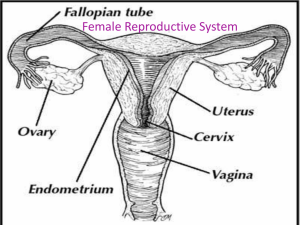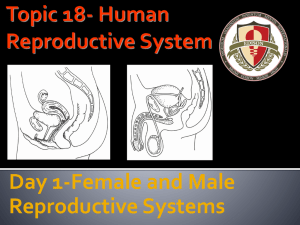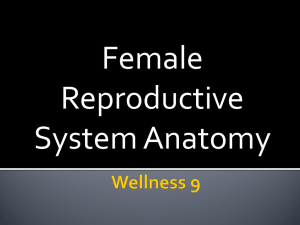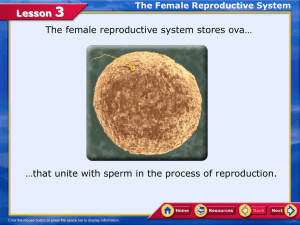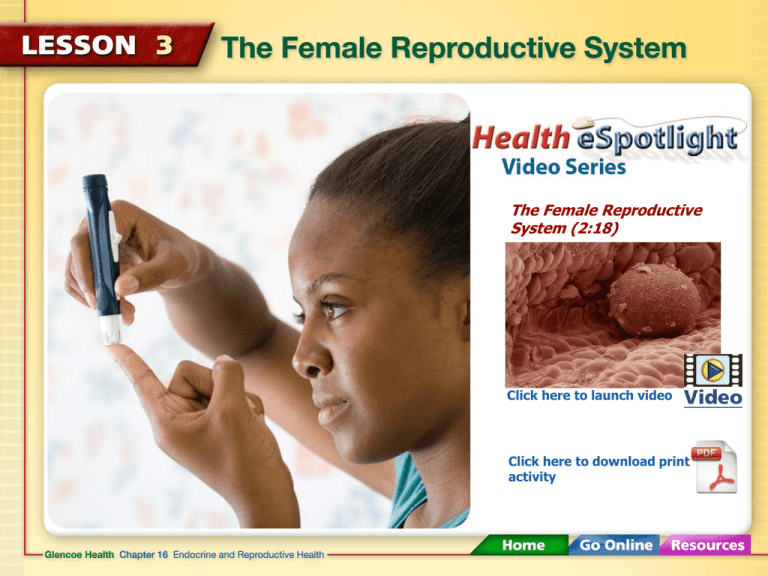
The Female Reproductive
System (2:18)
Click here to launch video
Click here to download print
activity
The female reproductive system
matures at puberty and enables
women to reproduce.
eggs
fallopian tubes
ovaries
vagina
uterus
menstruation
ovulation
cervix
Female Reproductive Organs
The organs of the female reproductive
system enable pregnancy to occur with the
first monthly ovulation.
The female reproductive system matures at
puberty.
Female Reproductive Organs
The female reproductive system has several
functions, including producing female sex
hormones and storing the eggs.
Eggs
Female gametes
Female Reproductive Organs
A female at birth has more than 400,000 immature
ova in her ovaries.
Ovaries
The female sex glands that
store the ova, or eggs, and
produce female sex hormones
Female Reproductive Organs
The ovaries are located on each side of the uterus.
Uterus
The hollow, muscular, pear-shaped
organ that nourishes and protects a
fertilized ovum until birth
Female Reproductive Organs
The process of ovulation is controlled by the
release of luteinizing hormone by the pituitary gland.
Ovulation
The process of releasing a mature
ovum into the fallopian tube each
month
Female Reproductive Organs
A mature ovum is released from an ovary and
moves into one of the two fallopian tubes.
Fallopian tubes
A pair of tubes with
fingerlike projections that
draw in the ovum
Female Reproductive Organs
Cervix
The cervix is the opening of the uterus.
Uterus
The uterus protects and nourishes a
developing fetus.
Ovaries
The ovaries contain ova and produce
hormones.
Fallopian Tubes
Ova travel to the uterus through the fallopian
tubes.
Endometrium
Endometrium tissue lines the uterus.
Vagina
The passageway from the uterus to the
outside of the body.
Female Reproductive Organs
Sperm from the male enter the female
reproductive system through the vagina.
Vagina
A muscular, elastic passageway
that extends from the uterus to
the outside of the body
Female Reproductive Organs
The fertilization of an egg by a sperm produces a
cell called a zygote.
When the zygote leaves the fallopian tube, it
enters the uterus and attaches itself to the uterine
wall. The fetus remains in the uterus until birth.
Female Reproductive Organs
After a female matures, the uterus prepares each
month for possible pregnancy. If pregnancy
doesn’t occur, menstruation occurs.
Menstruation
The shedding of the
uterine lining
Female Reproductive Organs
The endometrium tissues pass through the cervix
and into the vagina.
Cervix
The opening to the uterus
Female Reproductive Organs
Maintaining Reproductive Health
Good hygiene, breast self-exams, and
abstinence from sexual activity help female
reproductive system health.
Sound health practices will help females care
for their reproductive systems.
Maintaining Reproductive Health
Tips for Maintaining Your
Reproductive Health
Bathe regularly.
Have regular medical exams.
Practice abstinence.
Breast Self-Exam
Breast cancer is the most common cancer and the
second leading cause of death, after lung cancer,
for women in the United States.
Breast Self-Exam
The American Cancer Society recommends that
females examine their breasts once a month, right
after the menstrual period, when breasts are not
tender.
Early detection is critical for successful treatment
of breast cancer.
Female Reproductive System Problems
Several disorders can affect the female
reproductive system, and some can lead to
infertility.
While menstrual cramps and premenstrual
syndrome are common, toxic shock syndrome
is uncommon.
Female Reproductive System Problems
Menstrual
Cramps
Cramps that occur at the beginning of a
menstrual period
Premenstrual
Syndrome
A disorder caused by hormonal changes
Toxic Shock
Syndrome
A rare but serious bacterial infection that
affects the immune system and the liver
Infertility and Other Disorders
Infertility in females can have several causes.
Endometriosis
Uterine tissue grows outside the uterus
STDs
Diseases spread through sexual contact
Vaginitis
Infection that causes discharge, odor,
pain, itching, or burning
Ovarian cysts
Fluid-filled sacs on the ovary
Cancer
Cancer of the cervix, uterus, or ovaries
After You Read
Reviewing Facts and Vocabulary
1. What is the function of the uterus?
The uterus protects and nourishes a
developing fetus.
After You Read
Reviewing Facts and Vocabulary
2. Distinguish between ova, ovaries, and
ovulation.
The ova are egg cells. The ovaries are the
female sex glands that store the ova and
produce female sex hormones. Ovulation is
the process of releasing a mature ovum
into a fallopian tube each month.
After You Read
Reviewing Facts and Vocabulary
3. Identify a kind of cancer of the female
reproductive system that is linked to a
sexually transmitted disease (STD).
Cervical cancer


